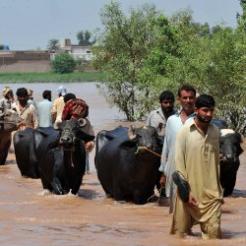As the world comes together to deliver aid to Pakistan, director of the Humanitarian Futures Programme at Kings College London, Rudolph C. Kent offers his thoughts on the conundrum of working with local organisations which fall into ethical red zones.
Conventional humanitarian agencies responding to crises such as the floods in Pakistan, are going to have to deal with influential and popular "non-state actors" such as Jama'at-ud-Da'wah, the hardline Islamist organisation thought to be a front for Lashkar-e-Taiba (LeT), which has incredible capacity to provide efficient relief for those affected by disaster.
This poses a tremendous dilemma.
Jama'at-ud-Da'wah is reported to have 2,000 members working on flood relief across the northwest of Pakistan and down into Punjab province. LeT is purported to be one of the largest and most active militant Islamist organisations in South Asia, and yet the humanitarian sector will be forced to work with or through a growing number of popular non-state networks which are performing a real humanitarian function, perhaps as - if not more - efficiently than conventional agencies.
The Humanitarian Futures Programme (HFP) at King's College, London discussed these fundamental changes in conventional humanitarian approaches to crises in a paper, Seven issues for humanitarian workers in the future, published two years ago. HFP has long been pressing for a fresh approach to disasters.
Clearly, as predicted, one of the challenges is the rise of the non-state actor. We saw this in Lebanon in 2008 when Hezbollah, a highly politicised movement, became one of the most efficient relief organisations in the Beirut crisis.
It's interesting to note that organisations that received USAID resources were not allowed by that body to work through Hezbollah.
Now we find ourselves confronted by an even more striking example of the need to deal with the growing number of new types of humanitarian networks. In this instance, it is Jama'at-ud-Da'wah in Pakistan, proving it is more aggressive and popular in effectively providing humanitarian assistance to hundreds of thousands of people.
Time for compromise?
The challenge faced by conventional humanitarian organisations is very fundamental and clear-cut.
My first question is, while ostensibly humanitarian organisations abide, are driven and motivated by principles of impartiality, neutrality and independence, to what extent does working with or through a non-state actor such as Jama'at-ud-Da'wah compromise these fundamental principles?
My second question is, even if conventional humanitarian agencies did compromise these fundamental principles, to what extent is the concern for saving lives a more compelling driving force? And, hence, to what extent do principles of impartiality, neutrality and independence weigh against the desire to protect the lives and livelihoods of endangered communities?
This issue now has to be addressed in the context of Pakistan. However, it's not just about Pakistan and the tragedy it faces today. It's about an issue the humanitarian sector will find it must deal with more and more as the dynamics and dimensions of future humanitarian hazards affect the world.
How will the established humanitarian sector work with a growing number of non-conventional networks that purport to be humanitarian? These non-state actors may not share the same principles but they have the capacity to be effective interveners. They are organisations that may have a political agenda, or profit motive, or the objective of engaging "hearts and minds". But we must focus on the fact that one way or another they have the competence and popularity to deliver the goods.
The humanitarian sector faces a stark choice: to embrace this fundamental change of emphasis in response to humanitarian crises, or to ignore the opportunity to join forces to mitigate human misery in response to present and future humanitarian hazards. It's a question that begs urgent attention.
Randolph C. Kent is director, Humanitarian Futures Programme at King's College London www.humanitarianfutures.org
(Image courtesy of United Nations Development Programme)









